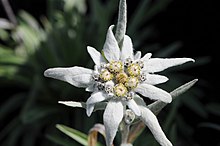Leontopodium is a genus of plants in the family Asteraceae. The genus is native to Europe and Asia.[1][2] The fuzzy and somewhat stocky "petals" (technically, bracts) could be thought of as somewhat resembling lions' paws—hence the genus name combining Greek léōn ('lion') and pódion ('foot').[3][4][5]
| Leontopodium | |
|---|---|

| |
| Edelweiss (Leontopodium nivale) | |
| Scientific classification | |
| Kingdom: | Plantae |
| Clade: | Tracheophytes |
| Clade: | Angiosperms |
| Clade: | Eudicots |
| Clade: | Asterids |
| Order: | Asterales |
| Family: | Asteraceae |
| Subfamily: | Asteroideae |
| Tribe: | Gnaphalieae |
| Genus: | Leontopodium (Pers.) R.Br. ex Cass. |

The genus includes the edelweiss (L. nivale),[6][7] a well-known plant from the mountains of Europe. The term edelweiss can, more rarely, refer to other members of the genus.[8]
Taxonomy
editThe following species are currently recognized:[9]
- Leontopodium albogriseum
- Leontopodium andersonii
- Leontopodium antennarioides
- Leontopodium artemisiifolium
- Leontopodium aurantiacum
- Leontopodium beerianum
- Leontopodium blagoveshczenskyi
- Leontopodium brachyactis
- Leontopodium calocephalum
- Leontopodium campestre
- Leontopodium chuii
- Leontopodium conglobatum
- Leontopodium coreanum
- Leontopodium dedekensii
- Leontopodium delavayanum
- Leontopodium discolor
- Leontopodium fangingense
- Leontopodium fauriei
- Leontopodium forrestianum
- Leontopodium franchetii
- Leontopodium giraldii
- Leontopodium gracile
- Leontopodium haastioides
- Leontopodium haplophylloides
- Leontopodium hayachinense
- Leontopodium himalayanum
- Leontopodium jacotianum
- Leontopodium japonicum
- Leontopodium kamtschaticum
- Leontopodium kurilense
- Leontopodium leiolepis
- Leontopodium leontopodinum
- Leontopodium longifolium
- Leontopodium melanolepis
- Leontopodium meredithae
- Leontopodium micranthum
- Leontopodium microphyllum
- Leontopodium monocephalum
- Leontopodium muscoides
- Leontopodium nanum
- Leontopodium nivale
- Leontopodium niveum
- Leontopodium ochroleucum
- Leontopodium omeiense
- Leontopodium palibinianum
- Leontopodium pusillum
- Leontopodium roseum
- Leontopodium rosmarinoides
- Leontopodium shinanense
- Leontopodium sinense
- Leontopodium smithianum
- Leontopodium souliei
- Leontopodium stellatum
- Leontopodium stoechas
- Leontopodium stoloniferum
- Leontopodium stracheyi
- Leontopodium subulatum
- Leontopodium villosulum
- Leontopodium villosum
- Leontopodium wilsonii
In popular culture
editLeontopodium nivale, the edelweiss, has been regarded as a national symbol of Austria, worn as a cap emblem by Austrian troops and displayed on Austrian coins.[10] A song about the plant, written by Oscar Hammerstein, was featured in the musical production The Sound of Music.[11]
References
editLeontopodium.
- ^ "Leontopodium". Digital Flora of Taiwan.
- ^ "Leontopodium". Flora of Pakistan.
- ^ λέων, πόδιον, πούς. Liddell, Henry George; Scott, Robert; A Greek–English Lexicon at the Perseus Project
- ^ Flora of China Vol. 20-21 Page 778 火绒草属 huo rong cao shu Leontopodium R. Brown ex Cassini, Bull. Sci. Soc. Philom. Paris. 1819: 144. 1819.
- ^ Altervista Flora Italiana, genere Leontopodium includes photos and range maps
- ^ "edelweiss". The Free Dictionary by farlex.
- ^ "edelweiss". Encyclopædia Britannica online.
- ^ Iza Goroff (July 2004). "Plant of the Month: Leontopodium souliei". Archived from the original on 2008-09-05. Retrieved 2008-06-10.
- ^ Flann, C (ed) 2009+ Global Compositae Checklist search for Leontopodium Archived 2014-11-06 at archive.today
- ^ Meriam, Ray (1999). Gebirgsjaeger: Germany's Mountain Troops. World War II Arsenal. Vol. 3. Merriam Press. p. 44. ISBN 1576381633.
- ^ Edelweiss in "The Sound of Music"